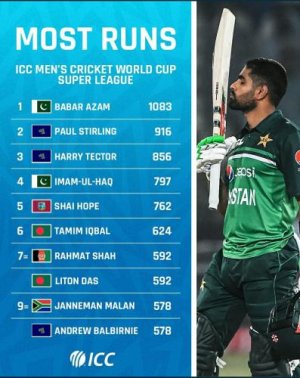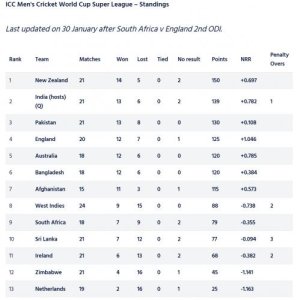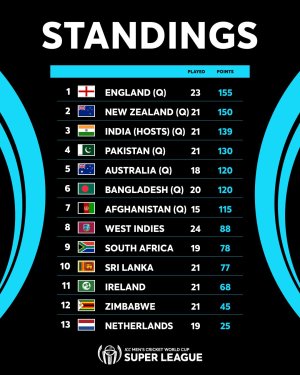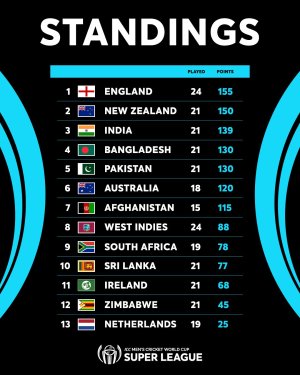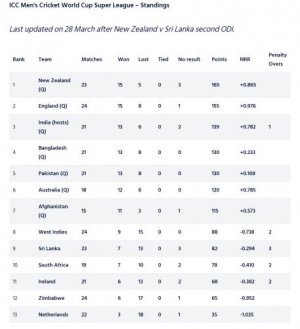Cricket's attempt at rejuvenating men's international 50-over cricket – the Cricket World Cup Super League – faces an unheralded finale in a three-game series between Ireland and Bangladesh being played in front of neither team's home fans.
The competition introduced three years ago by the International Cricket Council in a bid to restore "relevance and context" to bilateral ODI series will come to an end this week in the quiet surrounds of Chelmsford, east of London.
Ireland are 'hosting' the series in the UK due to weather and financial concerns over playing cricket at home, with skipper Andrew Balbirnie admitting: "I'm not going to sit here and say that we want to be here necessarily.
"Essex have been really good at facilitating us, they've made us feel as home as possible, but certainly as an Irish cricketer, you want to play your home games in Ireland and you want to play in front of your crowd that are really passionate about the game, and friends and family," he added.
It's an unfortunate conclusion to a competition which had its fate confirmed by the ICC last November. The governing body announced the previous system of basing World Cup qualification on the ICC's team rankings would return for the lead-in to the 2027 event.
The Super League was launched in July 2020 with the intention of seeing the ICC's 12 full members and a qualifier (for this cycle, The Netherlands) each play four home and four away series, with the top seven teams (plus hosts India) earning a ticket to the 2023 World Cup.
The bottom five teams' last shot at making the showpiece event would then come in a 10-team qualifier tournament, scheduled to be held in Zimbabwe in June-July this year.
In theory, it marked a streamlined way for fans to understand the relevance of each ODI series and for a more equitable qualification system for World Cups.
By that first bit of criteria, the ODI Super League could be considered a success.
The League's final series still has plenty at stake for Ireland, who can secure their spot at this year’s World Cup with a clean sweep of Bangladesh. They would also need to improve their net-run-rate to leapfrog South Africa into eighth position on the Super League standings.
It would be a deserved reward for a cycle in which they have beaten South Africa and England in ODIs.
By contrast, previous World Cup winners West Indies and Sri Lanka have been punished for poor results and will need to get through the qualifier tournament to make the World Cup.
The Super League even proved reasonably resilient to the pandemic. Many series were postponed but most found new windows to be played; for example, the Netherlands last month 'resumed' a three-game series against South Africa 16 months after leaving the country due to a new Covid strain.
At the Super League's conclusion there will be four series that were never played, somewhat compromising what the concept had intended to achieve.
Three of those scrapped series involved Afghanistan, who were supposed to host Australia and Pakistan, and tour India, during the three-year cycle.
Australia pulled out of their mooted ODI tour of the UAE to play Afghanistan, while Pakistan did not see the point in playing their ODI series against their neighbours when both sides had already secured qualification for the World Cup. Three T20s were played in Sharjah instead.
"We didn't find any attraction playing the (ODI) series. It's mainly because the series was meant for the (Super League) points, and now no matter who wins it won't make a difference," Pakistan Cricket Board chairman Najam Sethi said in January.
The India-Afghanistan ODIs were simply never scheduled, though the BCCI has flagged the likelihood of Afghanistan touring in June, well after the end of the Super League.
Instead, Afghanistan have qualified for the World Cup by beating the Netherlands, Ireland and Zimbabwe. They lost the only ODI series they played against another team that has qualified for the World Cup, Bangladesh, in February last year.
But arguably the most confusing aspect of the Super League for cricket fans has been the sheer number of 50-over games played outside of the ICC's World Cup qualification structure.
Australia have played 11 one-dayers that were not for Super League points in the past 12 months (five against Sri Lanka and three each against England and India) compared to 18 for Super League points across the three-year lifespan of the competition.
India have been even busier; since the Super League was launched in July 2020, they have played a whopping 21 ODIs that have not been for Super League points, the same number as they played that were for Super League points.
England (who have played nine ODIs not for Super League points over that same period), West Indies (8), New Zealand (8) and Sri Lanka (7) have also played significant numbers of what some would label 'meaningless' one-dayers.
The ODI landscape beyond the 2023 World Cup could look significantly different.
Pakistan, for instance, have just one bilateral 50-over series scheduled on the Future Tours Programme for the next 18 months, against Afghanistan.
And given their chairman's view on the relevance of their most recently scheduled ODIs against that nation, that series could be in jeopardy as well.
Considering the congested international calendar and the rise of domestic T20 leagues, it could be a sign of things to come.
https://www.cricket.com.au/news/odi...d-australia-50-over-cricket-future/2023-05-09






